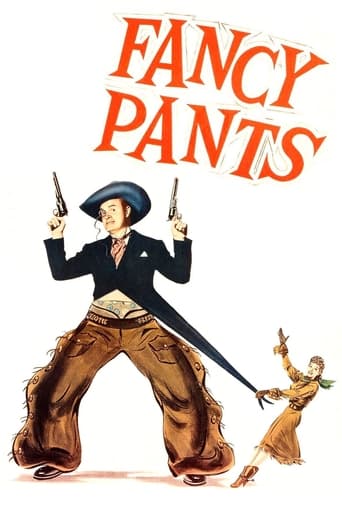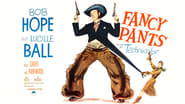SimonJack
Bob Hope and Lucille Ball were at the top of their careers when they made "Fancy Pants" in 1950. Both would stay at the top for three more decades. In this film, the two are joined by a supporting cast of several long-time performers for what appears to be a rollicking fun time with the process. Hope plays an actor (Arthur Tyler) who plays a butler (Humphrey) who plays an English nobleman (the Earl of Brinstead). Ball plays Agie Floud, a wealthy young American Westerner. Joining the fun are Bruce Cabot as Cart Belknap, Jack Kirkwood as Mike Floud, Lea Penman as Effie Floud, Eric Blore as Sir Wimbley, and John Alexander as Teddy Roosevelt. The movie is a hoot as the plot moves from a theater stage in London, to a train across America, to the Floud's hometown in the American Southwest. This comedy has a nice mix of funny lines, slapstick accidents, and silly to hilarious situations. It's a light piece of entertainment that the whole family should enjoy.
classicsoncall
By the time this film came out, Bob Hope's name would have been a household word, which along with the plot device, might have been the reason he was introduced in the opening credits as Mr. Robert Hope (formerly Bob). Lucy's household name status was still a few years off even though she had a considerable resume by this time with over eighty movie appearances, though many of them bit parts and uncredited. The only time I ever saw them work together would have been on one of the old Dean Martin Celebrity Roasts, so catching them in this sixty five year old film was something of a treat. They actually had a decent chemistry here amid the myriad of jokes and pratfalls.Based on the earlier "Ruggles of Red Gap" series of films, it's pretty safe to say that Hope is no Charles Laughton, who lent an air of wit and sophistication to his version of the character in the 1935 movie. In this picture, Hope's character is an actor named Arthur Tyler, transplanted to the New Mexico territory of 1905 by a would be socialite in order to impress her neighbors. Effie Floud's (Lea Penman) daughter is Aggie, portrayed by Lucille Ball, in a characterization that comes fairly close to her zany Lucy Ricardo of 'I Love Lucy' fame.The picture routinely uses the names from the Laughton movie, the Flouds are still the Flouds, but variations like Brinstead replace Burnstead, and of course there was no Humphrey in the earlier picture, the first name we come to associate with Hope in the picture. Here he has a nemesis in the way of Cart Belknap (Bruce Cabot), Aggie's fiancé and a major thorn in Humphrey/Tyler's side. During an era when political correctness was all but unheard of, the appearance of characters like Wampum the kitchen hand and Wong the cook often tend to embarrass, but more so for their acting then their actual roles.Fans of Hope and Ms. Ball will certainly want to catch their camaraderie here. It's an entertaining picture with a fair share of laughs, and if nothing else, you'll wonder how they ever came up with that bird cage hair-do for Lucy, I mean Aggie.
kenjha
A rich American woman hires a British butler and brings him to New Mexico unaware that he's an American actor. A disappointing remake of "Ruggles of Red Gap," given the potentially potent teaming of Hope and Ball. The first segment of the film that takes place in Britain is so lame that it doesn't even elicit a chuckle. Once the action moves to New Mexico, there are a few laughs but the comedy is still labored. The funniest bit has to do with dogs chasing Hope instead of the fox during a fox hunt. Hope and Ball seem to be trying but the script is a dud. Alexander, who imagined he was Teddy Roosevelt in "Arsenic and Old Lace," plays the president here.
lonniebealeusa
Made over fifty years ago and still a treat to watch. A wonderful campy performance by Bob Hope,posing an an english Lord and Lucille Ball as a real tough western cowgirl really make this movie a lot of fun. Not to be missed is Bob as the english Lord describing his army exploits at a party.Bruce Cabot playing his usual bad tough guy keeps the movie on an even keel,but the laughs still come thick and fast mainly through Hope's attempt at an english accent. The one disappointing aspect was the finale,which seemed flat and made me wonder if the writers just couldn't be bothered with coming up with any more good lines. The late'40's and '50's were good film years for Hope and this movie shows why audiences kept coming back for more.




